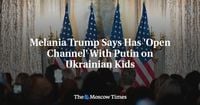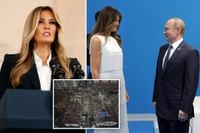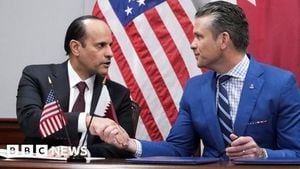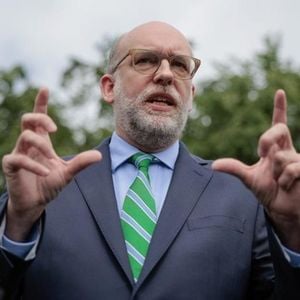In a move that has surprised diplomats and captivated international media, U.S. First Lady Melania Trump revealed on October 10, 2025, that she has been quietly negotiating with Russian President Vladimir Putin to secure the return of Ukrainian children forcibly transferred to Russia during the ongoing war. The announcement, delivered in a rare solo appearance at the White House, marks a significant—if cautious—step forward in one of the most heartbreaking humanitarian crises of the conflict.
"A child’s soul knows no borders," Melania Trump declared in her statement, as reported by The New York Post, highlighting the emotional weight of the issue. The First Lady confirmed that eight Ukrainian minors had been returned to their families in the past 24 hours, a development she attributed to an "open channel" of communication established with Putin after she delivered a personal letter to him at the U.S.-Russia summit in Alaska this past August.
According to AFP, the back channel began when Melania Trump handed her letter to President Trump, who then passed it to Putin during the Alaska summit on August 15, 2025. "Much has unfolded since President Putin received my letter last August. He responded in writing, signaling a willingness to engage with me directly, and outlining details regarding the Ukrainian children residing in Russia," Melania Trump told assembled reporters. She added, "Since then, President Putin and I have had an open channel of communication regarding the welfare of these children."
The eight children recently returned are just a small fraction of those affected by Russia’s full-scale invasion of Ukraine, which began in February 2022. Ukrainian officials estimate that nearly 20,000 children have been abducted or separated from their families, with many scattered across more than 200 facilities in Russia for so-called "re-education" and, in some cases, military training, as detailed by the Yale School of Public Health Humanitarian Research Lab and cited in The New York Post. Some children have reportedly been placed in adoption databases, raising fears among humanitarian groups that forced assimilation and identity erasure are at play.
The Kremlin, for its part, has maintained that the transfers are necessary "evacuations" to protect children from frontline dangers. However, the International Criminal Court (ICC) issued an arrest warrant for President Putin and his children’s rights commissioner, Maria Lvova-Belova, in March 2023, citing the forced deportations as a violation of international law. Kyiv continues to press for the return of all abducted children, making this issue a diplomatic priority.
Melania Trump’s intervention appears to have yielded tangible results. She explained that three of the eight children returned were evacuated to Russia without their parents due to frontline fighting near their homes, while the remaining five were separated from family members across borders, particularly in the Russian-occupied Donbas region. The First Lady also noted that Russia has provided "biographies and photographs of each child involved in this week’s reunification, along with an overview of the social, medical, and psychological services afforded to the Ukrainian children." This level of transparency, she asserted, is a sign of "willingness to disclose objective and detailed information reflective of the current situation."
Adding to the complexity, one of the eight children was actually returned from Ukraine to Russia, a detail highlighted by AFP. This underscores the tangled human realities created by years of shifting frontlines and divided families.
Behind the scenes, the diplomatic effort has involved several "back channel meetings and calls," Melania Trump said. Her representative has been working directly with Putin’s team to ensure the safe reunification of children with their families. The First Lady described the initiative as "built on shared purpose and lasting impact," and emphasized that "plans are already underway to reunify more children in the immediate future." She concluded her address with a hopeful note: "I hope peace will come soon; it can begin with our children."
The First Lady’s involvement has not gone unnoticed by Ukrainian officials. During the United Nations General Assembly in September 2025, Melania Trump met with Ukrainian First Lady Olena Zelenska to discuss the issue. According to Ukraine’s Ambassador to the U.S., Olha Stefanishyna, Zelenska expressed gratitude for Melania Trump’s "soft power" and her efforts to facilitate the return of kidnapped children. Zelenska, who leads Kyiv’s "Bring Back Kids" initiative, called the abductions "one of the most heartbreaking consequences of this war," adding in an interview with The New York Post: "We could not protect their rights when the Russians took them—without consent, without records, without any transparency."
The emotional toll on returning children is profound. Zelenska noted, "The children who come back are subdued mentally—they’re broken. … Only after they return do they start coming back out of their shells." The psychological scars, she suggested, may linger long after the physical reunifications are complete.
For the Trumps, the announcement also signals a subtle shift in the administration’s approach to Russia. Just weeks ago, President Trump made headlines by thanking Putin on his social media platform, Truth, for his role in supporting peace talks related to Gaza. The two leaders’ public gestures—once marked by frosty exchanges and sharp rhetoric—now hint at a tentative thaw, at least on certain humanitarian issues.
Yet, the broader context remains fraught. While Russia has agreed to repatriate not just minors but also those who were forcibly moved as children and have since turned 18, the overall number of abducted Ukrainian children remains staggering. Ukrainian authorities reported in 2024 that at least 19,500 children remain unaccounted for, though the true figure could be even higher, given the chaos and lack of transparency that have defined the war’s darkest chapters.
International response to the First Lady’s initiative has been cautiously optimistic. Humanitarian groups have welcomed any progress but continue to call for robust oversight and independent verification of Russia’s claims. The ICC’s arrest warrants remain in force, and the world is watching to see whether this diplomatic opening will result in a broader resolution or simply a handful of high-profile reunifications.
For now, Melania Trump’s efforts have brought a rare moment of hope to families torn apart by war. As diplomatic channels remain open and further reunifications are planned, the fate of thousands of Ukrainian children hangs in the balance. The world waits to see whether this unexpected collaboration can grow into something larger—or if, as so often happens in war, hope will once again be deferred.





